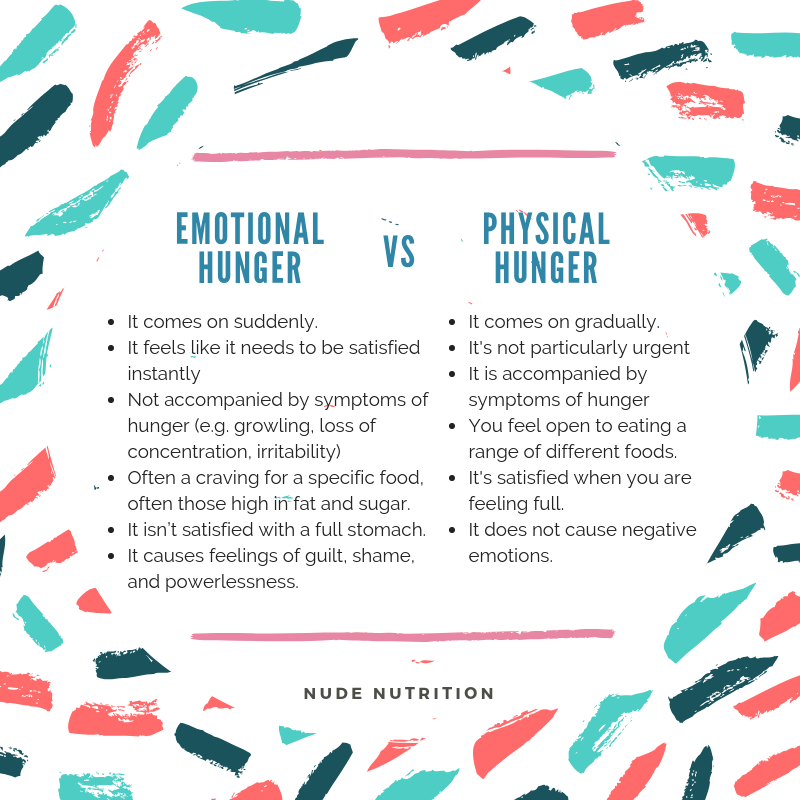Why Am I Always Hungry?
Registered Dietitian, Katherine Kimber answers the most common reasons people wonder “why am I always hungry”.
There it is again… that insatiable hunger, you’ve already had lunch, and it’s your 4th trip to the fridge to seek out food. “Why am I always hungry”, you ask. Huffing to yourself.
Whilst I talk a lot about intuitive eating, honouring your natural signals, and listening to your body, you might be wondering why you’re still back and forth looking for food, when you know you’ve already eaten and you’re not hungry! This article dives into 9 common reasons why you feel hungry all of the time.
In principle, eating should be quite simple. You get hungry, you eat, you move on with your day. But unfortunately, our diet plagued society teaches us that we can’t be trusted to listen or respond to our own bodies. That we try to control and stop feeling hungry. That we need to look to external sources (like the clock, apps, portion sizes, labels, calories, meal plans, points systems) to tell us when to eat, what to eat and how much to eat.
These external sources can teach us to go to our head to make decisions around food, as opposed to connecting with our bodies and what it really needs. And whilst of course we do need to use our mind to make decisions, there is a difference between a a diet driven mindset, and a self-care mindset:
(a) “I can’t possibly be hungry. I just ate breakfast an hour ago. Eugh. Why do I always feel hungry” (diet mindset, results in guilt, not honouring body)
And
(b) “I’m noting hunger signals despite eating breakfast an hour ago (curious mindset). My body needs more food today. I better eat something (connecting with the body, recognising the need to eat, which is a self-care, compassionate mindset)”
Listening to the diet mindset (a), can create body distrust, and disconnected eating. We are made to feel guilty, for simply nourishing our bodies.
In this article, I am therefore going to outline 9 common reasons why you might feel hungry all the time, and how to connect with your innate wisdom and know what your body needs.

But are you really eating enough?
Hunger doesn’t just show up in the stomach, so this is really important. Because the only way to satisfy physical hunger is by eating enough food. The single biggest reason why you might be feeling physically hungry all of the time, is simply that you’ve not eaten enough at your last meal, throughout the day, or even yesterday.
Whilst diet culture teaches us that we can’t be trusted around food, and that we can’t control ourselves, I want to remind you that you don’t need to “earn your food”. You don’t need to deprive or withhold yourself. In fact, by doing so, it might be suppressing energy levels, and limiting your ability to pursue things that are important to you. Hunger is normal, healthy and a sign that your body is working. Having regular hunger signals may be a sign that your body is working as it should! When we habitually ignore these signals, they atrophy over time and our ability to listen and respond is compromised.
What does physical hunger look like?
Physical hunger can show up in a number of places, not just the stomach.
For example:
- Head: achey, light headed, dizzy, distracted, poor concentration
- Energy levels: tired, sleepy, sluggish, meh
- Mood: hangry, irritable, cranky, snappy, moody, low
- Stomach: gurgling, rumbling, emptiness, stomach ache, gnawing, sicky feeling
- Body: shaky, quivery, low blood sugar, salivating, sicky feeling in throat or chest
Developing awareness of, and sensitivity to, these internal physiological sensations (more technically known as interoceptive awareness) through consistent practice and listening, can help you to develop more trust in your body. Preliminary research also indicates that eating in response to early signs of hunger may help improve long-term blood glucose control.
Are you filling up on rice crackers and celery? (Aka high bulk low calorie foods?)
Foods with a lot of bulk will make you feel full. However, if they are low in calories, they may not be satiating. These foods contribute to feelings of fullness, but have short-lived fullness, because they are low calorie foods. It’s the reason why, for example, you could eat a meal consisting of a big vegetable salad, with a can of diet coke, and truly feel full, but end up hungry again shortly after or feel as if something is missing.
High bulk low calorie foods: Usually fruits and vegetables. For example, a large salad without protein or starch or vegetable soup might leave you feeling physically full but unsatisfied.
Air foods: Air foods fill up your stomach, but offer little (if any) energy. They are typically foods eaten on diets such as rice cakes, low calorie cereal bars, and sugar free drinks.
Low carb or artificially sweetened foods: These foods tend to replace carbohydrates with sugar alcohols and indigestible fibres. These replacements can make you feel temporarily full. If eaten in excess, they can cause bloating and discomfort. This includes some energy bars, sugar-free jelly, low carb desserts and snacks.
The body generally feels full and satiated on meals that contain a combination of starchy grains, fibre (fruit/vegetables), proteins, fats, calcium and a good dose of flavour, texture and satisfaction!
Are you truly satisfied?
There is one psychological dimension to physical fullness that wellness culture doesn’t often get us to consider, and that is satisfaction. I’m sorry, but celery juice just doesn’t cut the mustard.
Fullness is the physical sensation of satiety, while satisfaction is the mental sensation of satiety. Maslow’s Hierarchy of Needs (the theory of human motivation” is a model that teaches us that we’re driven by our unmet needs. Whether this be in food, relationships, careers. So if we’re not satisfying our needs, we’re not happy. We therefore seek out food that drives satisfaction. Satisfaction and pleasure are at the core of eating!
I have a little exercise for you.
Think about the last meal you ate.
How would you rate this on a scale of 0-10? 10 being the most satisfying meal you’ve ever eaten, and 0 the least?
Now think about this.
If you could boost the satisfaction (forgetting about what you may deem as “good/bad” food) what would you change?
Sometimes we need to add something extra to round off the meal, or change the environment, and generally boost the satisfaction factor of the eating experience.
For example, eating in a more relaxed environment, adding some cheese to your pasta, or a slice of crusty chewy bread to a heart soup?
But why do I always feel hungry even after eating?
Do you ever have that feeling of fullness in your stomach, but a desire to eat something sweet?
This is called “taste hunger” and is completely normal. Taste hunger occurs when you have a taste for a specific food that may present itself outside of physical hunger or alongside it.
Basically, taste hunger is when you want to eat food that just sounds good! Like a sweet, after a meal. It’s really normal to have the desire for a little something to round off your meal and provide the “satisfaction factor”. Like sweets, biscuits, ice-cream, fruit, yoghurt, hot chocolate etc.
Diet culture teaches us that having something sweet is “bad”. This can lead to a negative judgement when we do eat something sweet, which can spiral into the “sod it mentality”. I’ve done it now, I might as well keep going.
So what to do?
Don’t panic and eat the sweet thing.
I know I am definately not hungry, so why do I still eat?
It could be an emotional response. Below outlines the differences between emotional hunger vs physical hunger. If you know you’re definitely not hungry, you know you have given yourself permission around foods, are satisfied by your food choices, and still want to eat… it might be an emotional hunger. Sometimes what people deem as physical hunger is emotional hunger. And vice versa. The diagram below might help, and you can read more about this in my article on how to navigate emotional eating.

Are you trying to pursue weight loss?
Dieting (which is the pursuit of weight loss), can interfere with our hunger hormones.
There are two key hormones that help regulate hunger – ghrelin and leptin.
Ghrelin is the hunger hormone, produced by the stomach mostly, but also the small intestine, pancreas and brain. It goes up in response to food deprivation (aka dieting). Ghrelin receptors are located in the brain (a small part called the hypothalamus). The more you ignore hunger, the more ghrelin gets produced to make you eat. The body is pretty clever! It typically switches off when you eat enough food. It’s not a matter of willpower when you cave in, and the diet fails. Biology is trying to make you eat and survive. Your body does not know that you may have a fridge full of food, and a supermarket around the corner.
However, for chronic dieters, ghrelin may stay elevated after meals as a result of being in a negative energy balance (aka withholding your body from energy). People who have lost weight, therefore, seem to have a higher level of ghrelin circulating around their blood, which can be elevated for a year after dieting! It’s no wonder weight loss maintenance is near impossible, when the body is working so hard to bring your weight back up.
The only way to make your ghrelin turn off, is to eat enough. This signals to another hormone leptin to say “hey, stop eating”.
The main message is that if you don’t eat enough, your body will continue to pump ghrelin, and make you feel hungry, until you eat.
Are you getting adequate nights sleep?
As mentioned above, there are two key hormones that help regulate hunger – ghrelin and leptin. When the body is sleep-deprived, the level of ghrelin spikes, while the level of leptin falls, leading to an increase in hunger. If you’re feeling abnormal levels of hunger and a desire to eat, check in with your sleep. Does this need some more attention?
Are you setting unrealistic standards?
Sometimes I notice my clients are setting an unrealistic standard for how much you “should” eat in a day, that they are consistently not able to. This is a sign that the standard is too high, and too rigid. Have you considered that you may not be allowing yourself enough food.
Too often, I see something like this…
- Greek yoghurt & berries for breakfast
- Nuts or fruit as snacks
- Greens & protein for lunch and dinner
Later on results in… out of control eating, coupled with guilt, and more out of control eating, only to start again tomorrow.
Biology will always win. So if you’re cutting out food groups (especially starchy foods which are a great source of fibre) or not allowing snacks, flexible eating, and “fun food” into your life, this may be why you’re constantly feeling hungry, unsatisfied, looking for and thinking about food.
The body is really clever at regulating what it needs. It generally needs food that contains fibre (for example: whole grains, oats, brown rice, pasta, fruits, vegetables, nuts, seeds, potatoes (with skin)), unless you have a specific medical condition where other recommendations have been made.
Medications to be aware of…
Some medication and medical conditions can increase appetite. The most common appetite-inducing medications include antipsychotics, antidepressants, mood stabilisers, corticosteroids, and anti-seizure drugs. If you think your medications are interfering with your appetite, it’s best to speak to your healthcare provider.
So what’s the verdict? Why am I always hungry?
I reiterate – the only way to satisfy physical hunger is by eating enough food. But as you can see, it’s also not that simple! There may be a number of reasons why you’re always feeling hungry, from not eating enough, not satisfying your true desires for fear of not being “healthy” or gaining weight, to looking for comfort, tiredness. Ironically, many of these behaviours are compounded by pursuit of weight loss, restriction and control. When we let go of this pursuit, and honour and connect with our body through intuitive eating, kindness, and compassion, a more trusting, connected and happy relationship with food is possible.
If you’re not entirely sure what the subtleties of physical hunger feel like for you, and you would like to learn more, you may benefit from diving into my free audio guide and workbook. This includes actionable steps towards finding food peace, and food freedom.







